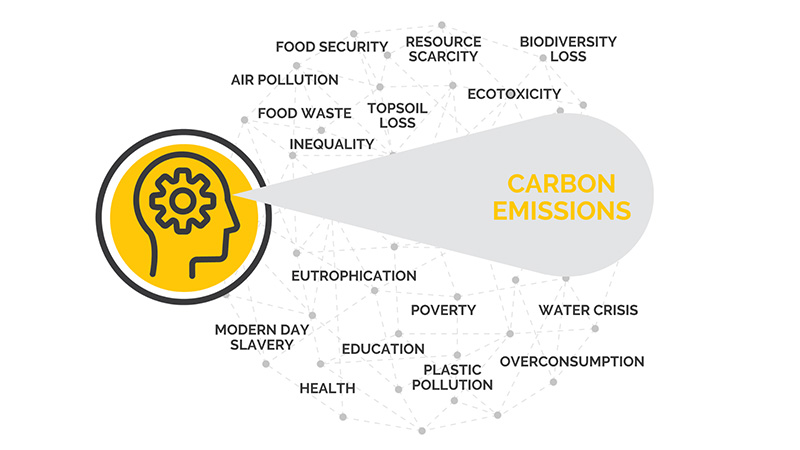Sustainability is about more than just carbon
A thought-provoking graphic popped up on my LinkedIn news feed recently of a man looking into a word cloud of sustainability and social issues, but his focus is only on one word – carbon.
Some of you may have seen the graphic – created by Dutch sustainability advisor and Research Fellow at Circular X, Jan Koneitzko – which illustrates the “carbon tunnel vision” which can often develop.
While it’s great there is such a growing social, business, and governmental interest in making carbon reductions there is a danger of it overshadowing the bigger sustainability picture.
Reducing carbon is a vital goal but there are number of other ecological, social and economic factors to be taken into account. We must be careful to avoid unintended consequences in the pursuit of emissions reductions.

Electric VS internal combustion engine (ICE) vehicles is a good, albeit simple, example. EV detractors point to the emissions resulting from the creation of EVs and the electricity needed to power them as proof they achieve little in reducing global warming.
While lifecycle analyses often prove this wrong, the detractors aren’t factoring in the other impacts. ICE vehicles emit a range of pollutants which contribute to respiratory illness and even death for millions of people worldwide every year.
Similarly, fans of EV’s need to consider the impacts of mining the materials needed for the batteries. Could they reduce their carbon footprint by simply using public transport, biking or walking more? After all, in New Zealand, around one billion journeys are less than 2km long.
It’s often those in the poorest countries which are the worst affected by unintended consequences, and who themselves have little opportunity for making change or making their voices heard. There are a raft of societal, environmental and economic impacts to take into account when working towards a more sustainable future.
Happily, though, it’s not just negative impacts which have knock-on effects. Addressing non-carbon related challenges in a holistic way on the road to sustainability can result in carbon reductions – positive knock-on effects.
Tackling overconsumption, for example, reduces greenhouse gas emissions, pollution, and reduces pressure on resources. Buying local supports communities around you while reducing emissions from transport.
Improving education means people are more able to make better choices which can positively impact the world around them, including reducing their carbon footprint. Similarly, tackling poverty allows people to make better decisions.
Regenerating ecosystems through rewilding, reintroducing native species and predator control stimulates biodiversity, benefits surrounding ecosystems, and acts as an effective carbon sink.
As Jan points out in his circular economy masterclass, steps taken to tackle a single issue are a good start, but a taking a holistic view and considering the effects your actions could have is key. It may be that taking a slightly different approach to solve a problem can have far greater positive impacts than simply reducing carbon emissions.
It’s not a journey you need take alone either. There are resources available and networks which you can join. In New Zealand there are a several sustainability-focused business groups as well as the Climate Leaders Coalition, which offer opportunities to draw on the experience, knowledge and understanding of those who are further along their sustainability journey.
Tackling carbon emissions is undoubtedly vital, but don’t let it be the beginning and end of your journey.







